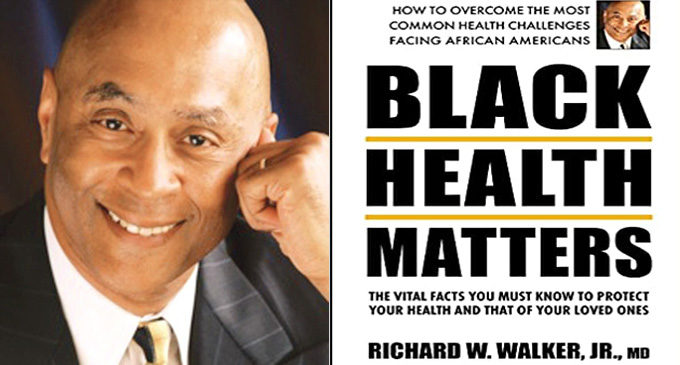Book Review: ‘Black Health Matters’ by Richard W. Walker, Jr., MD

This morning, your head hurt something terrible.
Is it anything to worry about? Your grandfather had heart problems and died after a stroke. Your grandmother suffered from diabetes and you know there’s got to be a way to avoid their fates. Does your headache have anything to do with that? Do you need “Black Health Matters” by Richard W. Walker, Jr., MD to calm your fears?
While growing up in Spanish Harlem years ago, Walker noticed how much diseases like heart disease, diabetes, and kidney failure affected the people in his neighborhood. It made hiim “angry,” he says, and it spurred him to study medicine as a profession.
It still dismays him that “poor health among our Black population” is almost epidemic, but there is a solution. Walker says that if you take an “approach to wellness” and take steps to remain healthier, you could lower your chances of developing the more common but most serious diseases that plague a higher number of African American people.
First of all, he says, be aware of your “gut-microbiome-brain” connection and know what foods are best for you. Know what not to eat, too, and how probiotics can help your “GMB.” Then, especially if you could stand to lose a few pounds, understand obesity, why it matters, and how you became overweight. Did you know culture has something to do with it? Yes, and though he only briefly touches on “food deserts,” Walker addresses these issues.
Walker says that Black adults are forty percent more apt to have high blood pressure than their white neighbors. Hypertension is a killer; knowing more about it – how to read a blood pressure monitor, how smoking and salt intake figure in – will help you keep it under control.
Know the general symptoms of diabetes and what to do about them. Learn how kidney disease may start with another disease altogether. Read up on cancer, aging, sickle cell disease, and how dental care really matters. Finally, memorize the signs of a stroke or heart attack; your life may depend upon it.
Your regular physician is all tied up and it’s hard to get in to see her. That doesn’t make you feel any better, but with its clear-cut, easy-to-understand chapters on a variety of illnesses both major amd minor, “Black Health Matters” might.
And yet, there’s one important thing to remember, once you get this book: it shouldn’t take the place of a physician with your medical chart in hand. That’s a reminder that author Richard W. Walker, Jr., MD offers, but caution and prudence don’t seem to be stressed here quite enough. Then again, readers will want to bear in mind that this book is about proactive and preventative wellness, not fixing what’s already broken.
The best use of this book, perhaps, is in the basics it offers: overviews, learning to read charts, understanding numbers, and making easy health changes. That’s all in here, it’s do-able, and it could make “Black Health Matters” a patient-empowering tool for understanding major health issues, recognizing them, and keeping ahead.









